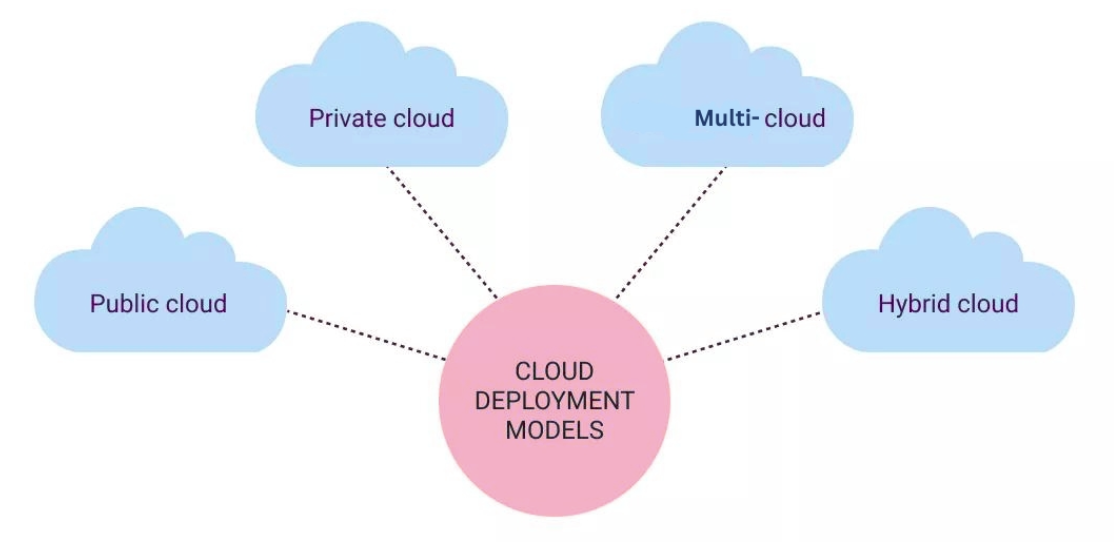
The ideal deployment model for cloud-based applications can significantly benefit your digital business. Choosing the right strategy enables you to fully utilize modern infrastructure, establishing a robust foundation for competitive digital products and services. It’s essential to understand the unique aspects of these models to make well-informed choices among the various available options, including public and multi-cloud.
Overview of Cloud Service Deployment Models
- Public Cloud
Public cloud platforms offer services for application deployment and storage via the Internet. This model’s main benefits are unparalleled scalability, flexibility, and cost-effectiveness. However, it’s important to note the compromises involved, particularly in data protection and compliance issues for sensitive or regulated data.
Advantages:
- Scalability: Adjust capacity based on changing needs.
- Cost-effectiveness: These platforms use a pay-as-you-go pricing model, aiding in expense optimization.
- Global Presence: Public clouds have data centers across the globe, enhancing latency and access.
Disadvantages:
- Potential issues with compliance.
- Lesser customization options in comparison to other models, such as private clouds.
Private Cloud
Private Cloud is designed for specific organizations and is either internally managed or handled by a third-party provider. It offers superior control, security, and personalization features in comparison to public clouds.
Benefits:
- Enhanced Data Protection: Data and resources are segregated, ensuring complete control over security standards.
- Personalization: Solutions are customized to meet unique organizational needs.
- Regulatory Compliance: Perfectly suited for sectors with strict regulatory demands.
Drawbacks:
- Significant initial and ongoing expenses.
- Less flexibility than the scalable options of public clouds.
- Necessitates specialized in-house data management skills.
3. Hybrid Cloud:
The hybrid cloud is a fusion of public and private cloud elements, catering to organizational needs. It provides a dual advantage by allowing fluid data and application movement between different environments and catering to diverse capacity needs.
Key Features:
- Integration: Seamless data flow between the public and private segments is crucial, necessitating strong integration solutions.
- Data Management: Effective strategies are key for maintaining consistency and security in a hybrid setup.
Benefits:
- Flexibility: This approach offers scalable solutions using public clouds while keeping sensitive data secure in a private setting.
- Cost Efficiency: Combining different cloud services helps align performance needs with budget limitations.
Challenges:
- Complexity: Managing varied environments can be demanding, especially for teams lacking technical expertise.
- Security Risks: Ensuring data integrity and confidentiality across a hybrid landscape demands significant security measures.
4. Multi-Cloud Strategy
This approach integrates multiple cloud computing services from various providers. Its primary aim is to reduce reliance on a single vendor, enhance performance during high demand, and increase system redundancy. Spreading tasks over several cloud platforms allows for greater flexibility and robustness.
Overview:
- Involves using services from a range of cloud providers at the same time.
- Provides backup and stability, safeguarding against failures or issues with one provider.
Benefits:
- Avoids being restricted to one cloud provider.
- Leverages the distinct strengths of various cloud services to boost performance.
- Improves overall system resilience and disaster recovery capabilities.
Drawbacks:
- Leads to more complexity in system management and oversight.
- May encounter difficulties with compatibility and cooperation among different cloud services.

Factors Affecting Your Choice
When choosing the right deployment model, several key factors must be considered to make an informed decision:
- Security and Compliance Needs: Different industries require varying security and compliance levels. For instance, sectors like healthcare, education, and banking must adhere to regulations such as GDPR. It’s vital to evaluate your data protection needs and compliance obligations to choose a deployment model that aligns with these requirements.
- Performance and Scalability Requirements: It’s important to understand your workload characteristics and future growth expectations. This understanding helps in determining the necessary performance and scalability levels. Some applications might need high computational power or the ability to scale quickly, which will affect your choice of cloud deployment.
- Budgetary Considerations: Public cloud solutions often offer a more budget-friendly, pay-as-you-go pricing model, while private clouds typically involve higher initial costs and ongoing operational expenses. Comparing the total cost of ownership across various deployment models is essential for making cost-effective decisions.
- Data Regulation Compliance: Compliance with data protection laws is crucial, as these regulations dictate where and how data can be stored and processed. For organizations operating in multiple regions, adhering to local data protection laws, which may require data to be stored in specific locations, is important. Understanding these regulations is key to ensuring legal compliance and avoiding the risks of non-compliance.
- Current IT Infrastructure and Expertise: Evaluating your existing IT infrastructure and expertise is crucial when considering different deployment models. Leveraging current resources and capabilities can influence the decision to either develop a private cloud or use public cloud services. Assessing how well new models will integrate with existing systems is important for minimizing disruption and optimizing efficiency.
Conclusion
Choosing the right model for cloud service deployment can greatly influence an organization’s functionality, efficiency, and security. It’s crucial to assess an organization’s unique needs and weigh aspects like security, scalability, and cost when deciding between public, private, hybrid, or multi-cloud options.
Engaging a reputable cloud software development firm such as O2 Technologies can provide valuable expertise in implementing cloud services. Their proficiency in handling the intricacies of cloud deployment can be pivotal in achieving the best performance and security tailored to your business requirements.
